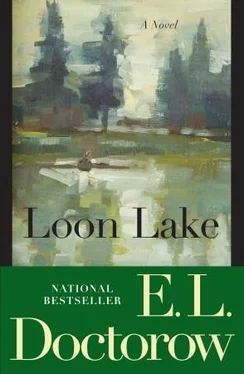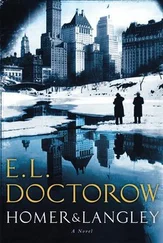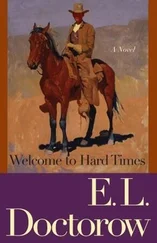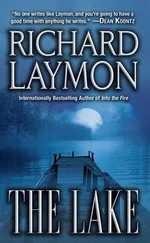As the morning advanced the sun was warm on my back. The air was sweet. I felt better. I was one of three or four workmen. A small truck with slat sides moved slowly among us to receive our leaves. We moved around to the back of the house and swept the leaves from two terraces, the upper with tables and chairs for dining, the lower with cushioned wooden wheeled lounge chairs for the view and the sun.
The lake out there a definite mountain lake, a water cupped high in the earth, its east and west shores hidden from view by intervening hills, its south shore across the water filled with pine and spruce that rose up straight on the mountainside in a kind of terror.
The lake glittered with fragments of sun, and flying over it were a couple of large black-and-white loons, big as swans. There was a boathouse down at the water in the same style as the main house. A dock going around the boathouse. A swimming float fifty yards out.
Between the terraces and the water line was a steep hillside garden of wild things, and through its paths we raked away the unwanted leaves from the bushes and plants.
I looked back up the hill to the house and felt the imposition of an enormous will on the natural planet. Stillness and peace, not the sound of a car or a horn or even a human voice, and I felt Loon Lake in its isolation, the bought wilderness, and speculated what I would do if I had the money. Would I purchase isolation, as this man had? Was that what money was for, to put a distance of fifty thousand acres of mountain terrain between you and the boondocks of the world?
The man made automobile bodies, and they were for connection, cars were democracy we had been told.
The wind rose in a sudden gust about my ears, and as I looked back to the lake, a loon was coming in like a roller coaster. He hit he water and skidded for thirty yards, sending up a great spray, and when the water settled he was gone. I couldn’t see him, I thought the fucker had drowned. But up he popped, shaking and mauling a fat fish. And when the fish was polished off, I heard a weird maniac cry coming off the water, and echoing off the hills.
A while later I followed the workers going along the hillside with their rakes through the trees past the stables to the staff house for lunch. The people of the light and dark green ate in a sort of bunkhouse dining room with long tables and benches. The food was put out on compartmented metal trays as in a cafeteria.
Fifteen, twenty of them looking at me as I hesitated with my tray and then slid into a place next to Libby, who smiled and looked with some satisfaction to the rest of the table. I was inspected by a heavyset man with thick black eyebrows I took to be the uncle she had mentioned. I gave back a clear-eyed friendly face don’t worry I’m no threat not me. After that I was ignored. I studied them all covertly: there were two, possibly three families of Bennett servants here. They did not make conversation. I had a palpable feeling of the politics of the place, the suspicious credential I had as a victim of the dogs. It wasn’t enough to crack their guild. They seemed confident of that.
Well, screw them, they couldn’t even understand that I wanted no part of it. When I was strong enough, a day or two, I’d be on my way down the railroad track and leave it to them to work out why. I still had the dollars I’d come with, stained brown with my blood but no less negotiable. Nobody here, not even Libby, knew my full name or had asked where I came from or where I’d been going.
The force of self-distinguishing which I found so foolish among stiffs and hobos was what I ran on. When you are nobody and have nothing, you depend on your troubles for self-respect. I had paid heavily for the bed and board. I wasn’t one of them, I was a paying guest.
I finished and walked out while they were still drinking their coffee. I’d be damned if I’d lift a rake or anything else. What could they do, fire me? I stood on the porch and thought about leaving right away, immediately.
And it was at this moment that I saw over the rise to the meadow two people on the tennis court — one of them a girl with blond hair.
I fixed my eyes on her and walked forward already confirmed in expectation by the agonized heave of my heart.
Mr. Penfield the resident poet, an absurd roundish figure in white shorts and a shirt stretched dangerously by an enormous belly, was showing from his side of the net the proper form of the forehand. Once twice three times he stroked the air. His lithe student, trim in a tennis dress, watched him while holding her racquet on her shoulder.
Penfield now hit a ball to her. Careless of all his advice, she swung at it with a great wild lunge and poled it far over the fence across the meadow. I saw tennis balls lying like white flowers everywhere.
He reached into a round basket for another ball and hit it gently, and again she took a furious swing and the ball flew over the fence. Once more he hit to her and she spun herself around missing the ball entirely. He said something to her. She glared at him, dropped the racquet and left the court.
She strode across the grass toward the main house. She tossed her visor away unpinned her hair fluffing it to the breeze ignoring him as he stood on the court and called after her in a voice half reproach half apology, “Clara! Clara!”
But she went over the crest of a slope and descended by degrees until only her head could be seen moving toward the house. Mr. Penfield hurriedly collected the tennis balls lying about the court. I did the same thing in the grass. We met at the court gate. His large bleary face gazed upon mine.
“She can’t bear to be taught,” he said, admitting me with a stunning lack of ceremony to his thoughts. “All I said was Take a level swing, don’t worry about hitting hard.’” He looked again in the direction she had gone. He smiled. “But what game can it be, after all, in which one doesn’t hit one’s hardest!”
He thrust into my hands the racquet and pail of balls and hurried off after her, moving lightly on the balls of his feet with that ability of some fat people to be quick and graceful. I stepped onto the court and picked up her racquet. I took everything to the shack not even thinking of it as the site of my grisly misfortune. I had forgotten misfortune. I headed back to the staff house, from one moment to the next, a worried probationary in my dark green shirt and pants no thought further from my mind than leaving. I wanted a job! Their job! Just as they knew I did. I would take up the rake or any other tool they had in mind oh God it was Clara, that was her name, Clara the girl on the train, no question about it, twice now the sight of her had stopped my heart.
I didn’t know what would happen in my life but I knew whatever it was it would have to do with her, with Clara. I thought even having her name was an enormous inroad of intelligence. Was she a Bennett? But wouldn’t they know their games, weren’t they trained to their tennis and their riding? This one, so blazingly beautiful and pissed-off, knew nothing, this one standing pigeon-toed and swinging stiff-armed at balls so incredibly breath-takingly awkward and untrained — no, she was not a relation. Was she a guest? If so, where were the others, she had come with a train, maids in waiting! an entourage! but they were nowhere about, only the resident poet Penfield ambled after her like her pet bear. Was she related to Penfield?
I would do anything be anything to know her and know about her. Dressed in dark green, a spy! I worked to show them how worthy I was, how useful, to show them how I admired what they were and how I wanted to be like them and one of them. How much time did I have? Only until the big man arrived, I had only that time to prove I shouldn’t be thrown out on my ass.
Читать дальше











